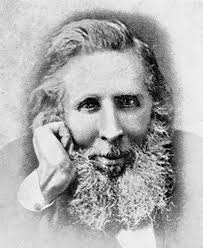
W. R. Wilde
Sir William Robert Wills Wilde (March 1815 - 19 April 1876) was an Irish otolaryngologist and ophthalmologist, as well as an author of significant works on medicine, archaeology and folklore, particularly concerning his native Ireland. He was the father of Oscar Wilde. William Wilde was born at Kilkeevin, near Castlerea, in County Roscommon, the youngest of the three sons and two daughters of a prominent local medical practitioner, Thomas Wills Wilde, and his wife, Amelia (d. c.1844), and received his initial education at the Elphin Diocesan School in Elphin, County Roscommon. In 1832, Wilde was bound as an apprentice to Abraham Colles, the pre-eminent Irish surgeon of the day, at Dr Steevens' Hospital in Dublin. He was also taught by the surgeons James Cusack and Sir Philip Crampton and the physician Sir Henry Marsh. Wilde also studied at the private and highly respected school of anatomy, medicine, and surgery in Park Street (later Lincoln Place), Dublin. In 1837, he earned his medical degree from the Royal College of Surgeons in Ireland. In the same year, Wilde embarked on an eight-month-cruise to the Holy Land with a recovering patient, visiting various cities and islands throughout the Mediterranean. Porpoises were flung on board the ship, Crusader, and Wilde dissected them. Taking notes, he eventually composed a two-volume book on the nursing habits of the creatures. Among the places he visited on this tour was Egypt. In a tomb he found the mummified remains of a dwarf and salvaged the torso to bring back to Ireland. He also collected embalmed ibises. Once back in Ireland, Wilde published an article in the Dublin University Magazine suggesting that one of the "Cleopatra's Needles" be transported to England (eventually in 1878 one of the Needles was transported to London, and in 1880 the other one was brought to New York's Central Park). In 1873 he was awarded the Cunningham Gold Medal by the Royal Irish Academy.

